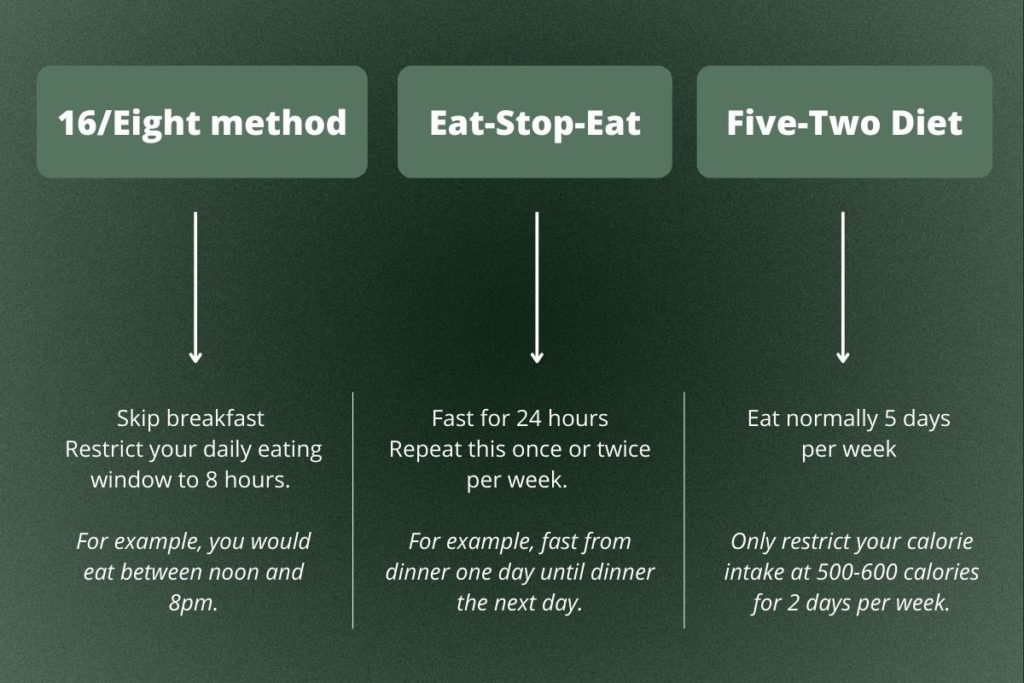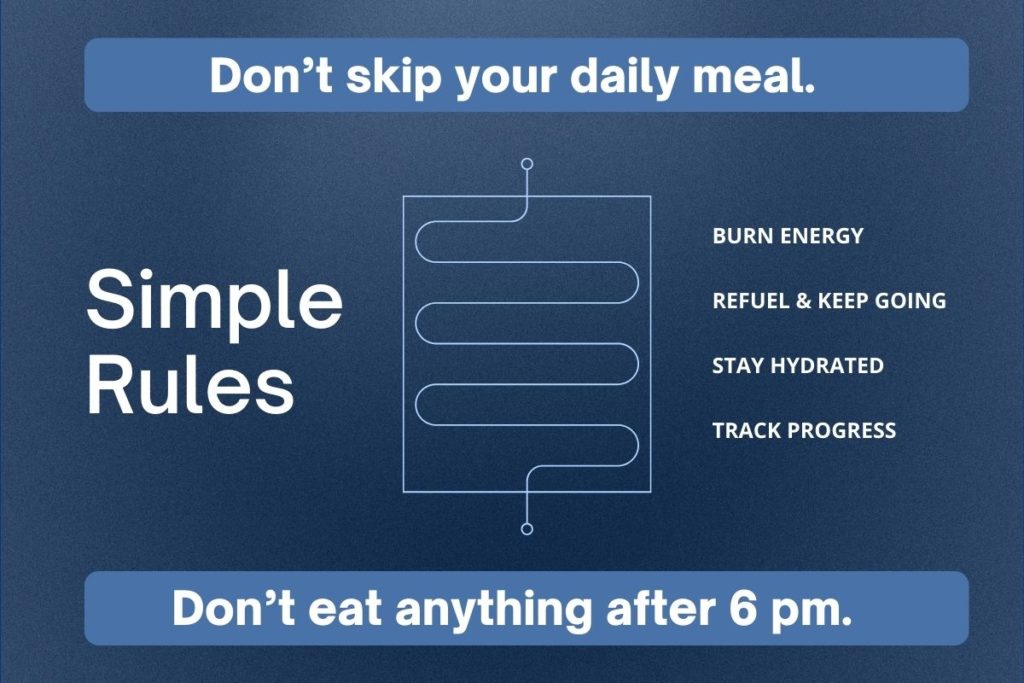Intermittent fasting has become one of the most popular diet trends in recent years. And for good reason – it’s a simple, healthy way to curb excessive calorie intake and lose weight. But like anything new, fasting can be daunting if you’re not sure where to start.
That’s why we’ve put together this guide – to help you prepare yourself for a successful IF journey. We’ll break down the different styles of fasting, give you some key tips for success, and help you identify any potential challenges you may face.
Here are 5 ways to prepare yourself before starting intermittent fasting.
1. Educate yourself on intermittent fasting

Before you start intermittent fasting, it’s important to understand the different styles of fasting and how they can impact your body. There are many resources available online and books that can help you learn more about this healthy diet trend.
Once you have a good understanding of how intermittent fasting works, you’ll be better prepared to make it work for you.
When it comes to intermittent fasting, there is no one-size-fits-all approach. It’s important to find a fasting style and schedule that works for you and your lifestyle.
There are many different ways to fast, so take some time to experiment and find what works best for you.
Some popular styles of intermittent fasting include:
- The 16/eight method: Also called the Leangains protocol, this involves skipping breakfast and restricting your daily eating window to eight hours. For example, you would eat between noon and eight pm.
- Eat-Stop-Eat: This approach involves fasting for 24 hours, once or twice per week. For example, you would fast from dinner one day until dinner the next day.
- The five-two diet: With this method, you eat normally five days per week and restrict your calorie intake to 500-600 calories two days per week.
There are many other intermittent fasting protocols out there. The key is to find one that fits your lifestyle and goals.

2. Start with a simple fast – 12 hours or less
If you’re new to fasting, it’s also a good idea to start with shorter fasting periods, like 12 hours, and gradually work your way up to longer durations. This will give your body time to adjust to the new eating pattern.
Once you’ve decided on a protocol, the next step is to plan your meals. This will help you stay on track and avoid feeling too hungry during your fast.
Some helpful tips for meal planning include:
- Make sure you’re getting enough protein and healthy fats. These nutrients will help keep you satisfied during your fast.
- Include plenty of low-carb vegetables in your meals. This will help you stay within your calorie budget and get the nutrients you need.
- Drink plenty of water. This will help you stay hydrated and avoid feeling sluggish.
Know your schedule.
Before you jump into any new diet plan, it’s important to know exactly what you’ll be eating. This is particularly important if you’re planning to fast for long periods of time.
The more consistent your eating schedule is, the easier it will be to keep on track – and stick to your goals.
To ensure you know exactly what you’ll be eating, we recommend using a journal or meal planner. Not only will this help you stay on top of your calorie intake, but it will also help you track your progress and make sure you’re doing everything you’re supposed to be.
Stick to the rules.

There are two important rules you should follow when it comes to intermittent fasting:
- Don’t eat anything after 6 pm.
- Don’t skip your daily meal.
The first rule is fairly obvious, but the second one is a little more complex – we’ll go into more detail below.
The main reason we suggest you don’t skip your daily meal is that your body needs food to maintain its energy. During the day, as you exercise and burn energy, your body needs to refuel to keep going. That’s why you should have a meal every day.
For example, with intermittent fasting, you can choose to only be eating between 9 am and 3 pm. You’ll still get all of the advantages of fasting, but you won’t be depriving your body of the nutrients it needs to function well.
3. Understand the risks and pitfalls of intermittent fasting.
Some people can go without eating for a short amount of time, but this isn’t necessarily the best way to lose weight. After all, the longer you take to eat, the more your blood sugar levels will drop – and this can cause you to feel hungry and crave more food.
In fact, research has shown that fasting for more than 16 hours could actually be bad for your health. That’s because it can cause some pretty serious health problems.
For example, it has been shown that fasting can cause insulin resistance and high blood pressure – which, if you have them, can lead to a myriad of other health problems.
In other words, if you have certain health issues, fasting could be more dangerous than the weight you’re trying to lose.
It’s important to be aware of the potential risks associated with intermittent fasting. Consult with your doctor and choose a plan that’s suitable for your lifestyle.
Make sure to drink plenty of water and avoid processed foods

When you’re intermittent fasting, it’s important to stay hydrated. This means drinking plenty of water throughout the day. You should also avoid sugary drinks and alcoholic beverages, as these can quickly offset any calorie deficit you’re trying to create.
In addition to staying hydrated, it’s also important to avoid processed foods. These are high in calories and low in nutrients, which means they won’t do much to help you reach your goals. Instead, focus on eating whole, unprocessed foods that will give your body the fuel it needs to function properly.
Processed foods are high in calories and low in nutrients, which means they won’t do much to help you reach your goals. Instead, focus on eating whole, unprocessed foods that will give your body the fuel it needs to function properly.
Stick with foods that are high in whole grains, fruits, and vegetables to help you achieve your objectives and maintain your health.
From preparing yourself mentally and physically to understanding the risks and pitfalls, these tips will help you set yourself up for success.
4. Plan ahead of time and make sure you’re consistent.
Before you dive into any new diet plan, it’s important to set realistic goals. Preparing yourself properly for intermittent fasting is essential for success.
Know how much weight and body fat you want to lose, how much you want to improve your health, and what kind of lifestyle changes you want to make.
This implies preparing your meals ahead of time and ensuring you have enough protein, good fats, and complex carbohydrates.
Protein is required for muscle growth and maintenance, while healthy fats aid in the maintenance of normal metabolism and inflammation reduction. Complex carbohydrates are a slow-digesting source of energy that may help you work out longer.
It’s also helpful to know what kind of meals you’ll be eating, and how your schedule will change. For example, if you’re eating four meals a day but won’t be eating for 8-10 hours straight, you may find yourself with an appetite that’s difficult to control at times.
Create a Routine
One of the best ways to make sure you stick with intermittent fasting is to create a routine. This means getting up at the same time each day and going to bed at the same time each night.
You should also try to eat your meals at the same time each day. This will help your body get used to a new way of eating and make it easier for you to stick with your plan.
Of course, there will be days when you can’t stick to your routine. But if you can make a point of sticking to it most of the time, you’ll find it much easier to maintain your fasts and see results.
Find a Support Group
Intermittent fasting may be tough, but you don’t have to go at it alone. There are several online support networks where you can interact with people who are also fasting.
These groups can provide you with motivation, inspiration, and advice when you need it most. They can also be a great way to vent when you’re feeling frustrated or stressed. You’ll be surprised at how helpful it can be to have others to talk to who are going through the same thing.
Plan to get enough sleep
IF may be tough on your body, so make sure you aim to get 7 to 8 hours of sleep each night. This will help your body recover from your fasts and be better prepared for the next one.
You should avoid drinking coffee or other caffeinated beverages late in the day, as they can affect your sleep. Try taking a hot bath or reading a book before bed if you’re having trouble sleeping.
To assist your body’s natural sleep rhythm, try to go to bed and get up at the same time every day. Take your time and focus on making small, sustainable changes.
You might not see results overnight, but if you stick with it, you’ll be surprised at how quickly you start to see and feel the benefits.
5. Give intermittent fasting a try for at least two weeks to see if it’s right for you.
If you’re thinking about trying intermittent fasting, commit to giving it a try for at least two weeks. This will help you determine if it’s something you can stick with long-term. It’s important to have something in mind when you start.
Keep in mind that there are many different ways to fast, so find the method that works best for you. And be sure to listen to your body. If you’re feeling lightheaded or dizzy, for example, it’s probably best to stop fasting and try again another time.
Set times for eating.
If you’re new to intermittent fasting, you may want to determine how long you’ll be fasting. For example, if you’re going to be fasting for 24 hours a day, you’ll need to have something in mind for when you’ll eat or drink.
You can also be flexible – if you’re not sure how long you’ll be fasting, you can simply start with longer periods of fasting and gradually work your way down.
You can always adjust your eating window as needed – if you find that you’re getting too hungry, try eating a little earlier. Or if you find that you’re not hungry at all, you can push your eating window back.
Don’t force it.
Intermittent fasting is not for everyone. If you find that you’re struggling to stick with it, don’t force it. There’s no shame in admitting that it’s not right for you.
There are many other diet and lifestyle changes you can make that will have a positive impact on your health. So if intermittent fasting doesn’t work for you, don’t give up – there are plenty of other options out there.
Be consistent.
One of the most common mistakes people make when they start intermittent fasting is that they try to eat the same amount of calories every day, regardless of how much they’ve already eaten during the day.
But that’s not the way your body works. So if you want to start intermittent fasting, you’ll want to do so in a way that works best for you.
If you’re someone who can easily over-eat, you’ll want to make sure you’re eating a lot less than what you typically eat in a day.
For example, if you typically eat about 2,500 calories every day, you’ll want to start intermittent fasting by eating around 1,500 calories every day.
That way, your body will start to adapt to your new diet and you’ll be able to lose weight faster.
Bottom line
Remember, there is no one-size-fits-all approach to IF.
It would be naive to think that one specific method of intermittent fasting will work for everyone. What works for someone might not work for you, and vice versa. That’s why it’s important to experiment with different methods and find the one that best suits your needs and lifestyle and stick with it.
With a little trial and error, you’ll be on your way to intermittent fasting success in no time!





